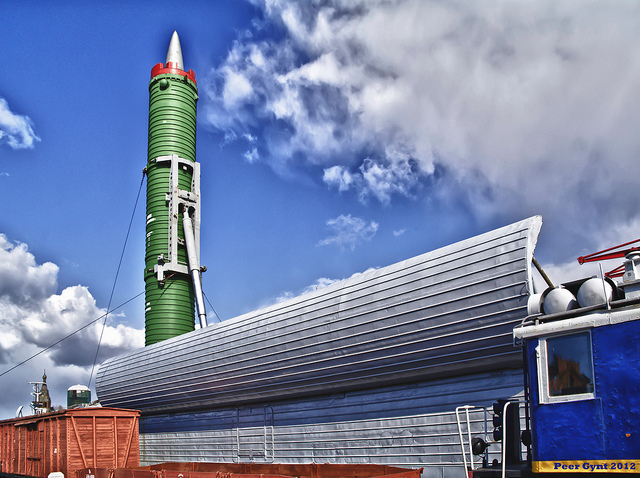
Recent events in Crimea have seen a number of commentators (
here,
here and
here) return to the notion that Ukraine made a mistake in the early 1990s by agreeing to give its nuclear weapons back to Russia. The issue is typically cast as a grand geopolitical ‘lesson’: that smaller countries living in close proximity to great powers can best preserve their independence of action through an indigenous nuclear arsenal. But is the Ukrainian example a case in point for that argument? For one thing, is it correct to think Ukraine ever
had an indigenous nuclear arsenal?
When the Soviet Union collapsed in 1991, three former Soviet republics—Ukraine, Kazakhstan and Belarus—found themselves with some elements of the Russian nuclear arsenal deployed on their soil. The largest such was in Ukraine, and numbered approximately 4,500 warheads, including strategic warheads as well as tactical ones. Ukraine hosted SS-24 and SS-19 intercontinental ballistic missiles as well as strategic heavy bombers. Under an agreement signed in 1994, Ukraine returned those nuclear warheads, and subsequently their delivery vehicles, to Russia. Those were the warheads that some commentators now think Kiev should have kept, the better to deter Russian adventurism against its territory.
An important starting point is to clarify the sense in which the weapons were ever Ukraine's. Certainly the weapons were deployed on Ukrainian territory. But that doesn’t mean Ukrainians controlled them. Nor does it mean that they could've taken control of them if they chose. By the end of the Cold War, both superpowers had built arsenals that were secure against theft—even theft by other nation-states. Russian nuclear weapons, like their American counterparts, are locked against unauthorised use. Those locks typically require the operator to enter some form of code into the weapon as part of the arming procedure. It's entirely likely that Ukrainians didn't have access to those codes: the Russians were never terribly good at sharing sensitive military information with the ethnic minorities who eventually made up more than 50% of the population of the former USSR. In effect, by the early 1990s, Ukrainian political authorities probably faced a situation where substantial numbers of nuclear weapons were deployed on their territory, but over which they had almost no control.
Could they have bypassed the security locks? The answer isn't clear, but my impression is that it couldn't have been done easily. They might have had to dismantle the warheads, remove the fissile material, and start again to construct new warheads. Yes, they would have had the fissile material from almost 4,500 nuclear warheads—and fissile material is the long pole in the tent of proliferation. And yes, they would have inherited a number of nuclear delivery vehicles—among them, intercontinental ballistic missiles and heavy bombers equipped with air-launched cruise missiles. But they would have inherited only a fraction of the expertise necessary to weaponise the fissile material and sustain that arsenal, and only fragments of the command and control system built to support them.
In brief, then, it's probably wrong to believe that Ukraine ever possessed its own nuclear arsenal; what it did was house a part of someone else's. In that sense, their decision to trade the weapons back to Russia in exchange for a guarantee written on a piece of paper (and a bucket of money from the US) is much more understandable. True, in the long run the guarantee hasn't amounted to much. But in the long run, neither would have the nuclear weapons.
Because Ukrainians never controlled the nuclear weapons they returned to Russia, it’s a bit hard to accuse them of forsaking a nuclear weapons option, and allowing themselves to be coerced by Russia’s superior conventional military strength. Precisely the same point can be made, though, against those who want to praise Ukraine for its disarmament ethic. On occasion, Ukraine (along with Belarus and Kazakhstan) is cited alongside South Africa as a nuclear disarmer. I've always thought that South African nuclear disarmament was one of the final expressions of apartheid; that a white minority government with nuclear weapons didn’t want to see a black majority government with nuclear weapons. But in the case of the three former Soviet republics, the better judgment is that they weren't nuclear disarmers for the simple reason that they were never actually nuclear armed in the first place.
The danger now, though, is that some national leaderships—perhaps even Ukraine’s—will begin to draw the wrong lessons from the 1990s. In the current environment, it’s not hard to conclude that smaller powers do have options to deter great powers, and to imagine that Ukraine’s experience helps argue that case.
Rod Lyon is a fellow at the Australian Strategic Policy Institute and an adjunct associate professor at the Griffith Asia Institute. Image courtesy of Flickr user David Holt. Print This Post
Print This Post